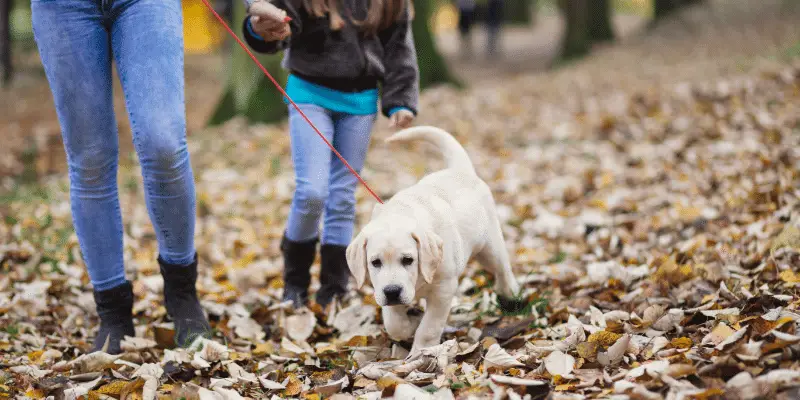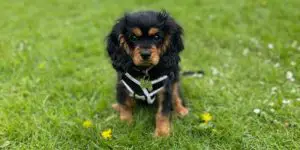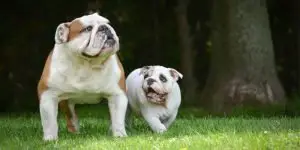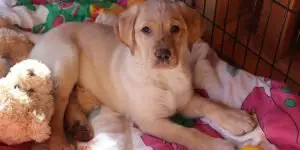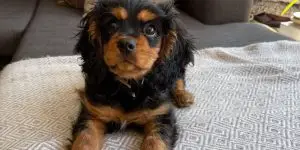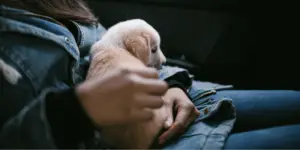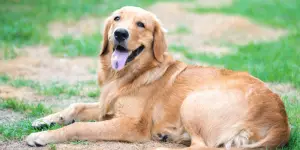
Week 12 Onwards Puppy Development – What to Expect
Now that your puppy is 12 weeks old, you’ve probably noticed they’ve come on leaps and bounds since they first came home. They should be settled into their environment and used to being around you (perhaps a little too much!).
This stage of development does have its ups and downs, but our guide should help you understand what to expect so you know exactly how to best care for your 12-week-old puppy.
If your pooch is a little behind on things in their development, don’t worry, our previous guide on 8-week-old puppies will lend you a helping paw on topics like potty and crate training.
12-Week-Old Puppy Schedule
If you’ve not already put together a daily schedule for your pup, make sure you do as dogs enjoy routine. Here’s an example schedule you could use for your puppy so they know what to expect each day.
| Time of day (Hour) | Activity |
|---|---|
| 7am | Potty break. |
| 8am | Meal and activity. |
| 10am | Potty break and sleep. |
| 12pm | Meal, potty, break, and activity. |
| 3pm | Sleep. |
| 4pm | Potty break and activity. |
| 5pm | Meal and activity. |
| 7pm | Sleep |
| 8pm | Potty break and activity until bedtime. |
| 10pm | Potty break and bedtime. |
| 2am | Potty break |
Although your puppy will have gained a bit more independence over the last month, the hard work isn’t over just yet. There’s still plenty of things and activities you’ll need to do with your puppy to help them become a happy and healthy adult dog.
- Keep on top of potty training and continue crate training.
- Take your puppy outside to relieve themselves every 4 hours.
- Feed between 3 to 4 times a day.
- Socialise your dog and introduce them to a variety of scenarios to minimise fear and excitement.
- Reward your puppy for good behaviour.
- Provide your dog with lots of toys and plenty of interaction.
- Exercise daily.
- Make sure your pooch has had their vaccinations.
- Get your puppy used to grooming.
- Regular water intake
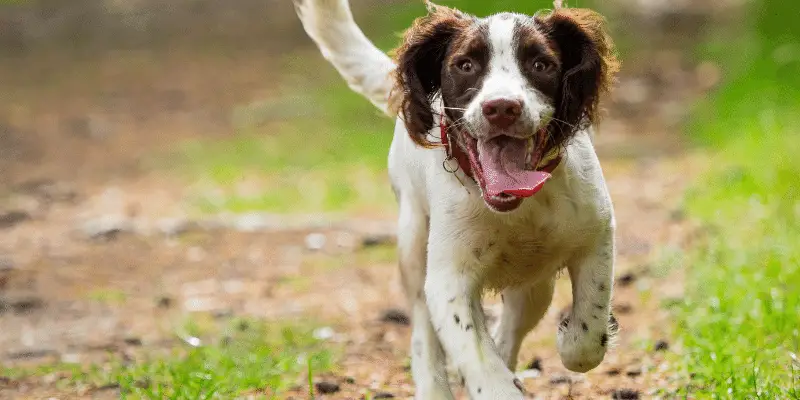
12-Week-Old Puppy Behaviour
A lot can change in a month. You’ve probably noticed that your puppy is growing bigger and stronger, with a lot more energy to boot. But what else is normal 12-week-old puppy behaviour?
Credit: The Canine Coach Dog Training
Teething
Between 10 weeks and 12 weeks old, your puppy will begin teething. At this age, dogs will have most of their baby teeth and a couple of adult front teeth, known as incisors.
Over the next few months, your puppy’s baby teeth will be replaced by adult teeth. The teething stage can be a bit of a nightmare as your puppy will want to chew just about anything.
Make sure your pooch has plenty of chew toys to occupy them, otherwise your furniture and belongings may take a bit of beating! Avoid letting your companion use their teeth on you while they play as you don’t want them growing up thinking it’s acceptable to bite, even non-aggressively.
Instead, redirect your pup’s attention to a toy to teach them that hands are not for chewing.
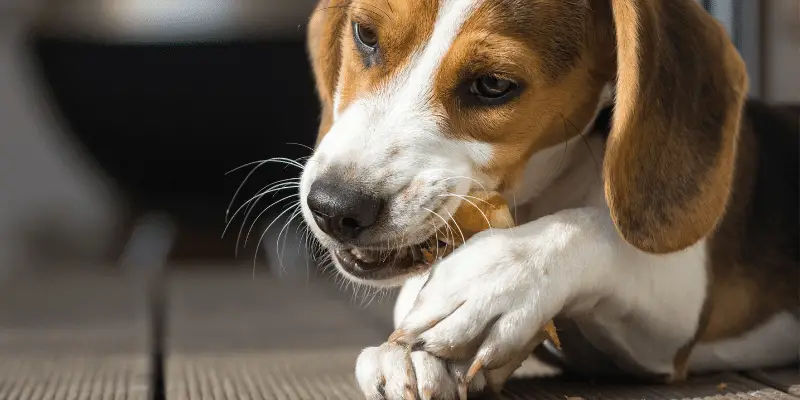
Agility
Young dogs are pretty clumsy, and you’ve probably seen your pup trip over their own paws multiple times. But at 12 weeks old, your dog is growing stronger and more coordinated. They can play and run with better accuracy than they could at 8 weeks old.
Playfulness
In addition to having more energy, your 12-week-old pooch will be extremely playful. Ensure you dedicate time to play with your puppy and offer them plenty of toys to keep them mentally stimulated.
Better Bladder Control
Puppies at 12 weeks old can hold their bladder for around 4 hours, compared to just 2 hours at 8 weeks old.
Sleep
Despite having more energy than they did a month ago, your puppy will still spend a large portion of their day snoozing. Expect them to sleep around 18 to 20 hours daily.
Your puppy will be getting used to its new sleeping environment compared to the first few nights where crying is common. Owners can get tempted to let their puppy sleep in their own bed to help comfort a distressed puppy but it can cause separation anxiety down the line.

Ask the Vet - How much sleep does a 12 week old puppy need?
"A 12 week old puppy sleeps a lot; about 16 to 19 hours a day. They still have plenty of growing to do and sleep much more than an adult dog. However, you should have noticed they are not quite as sleepy as when they first arrived and take less little ‘cat naps’".
- Dr Linda Simon MVB MRCVS
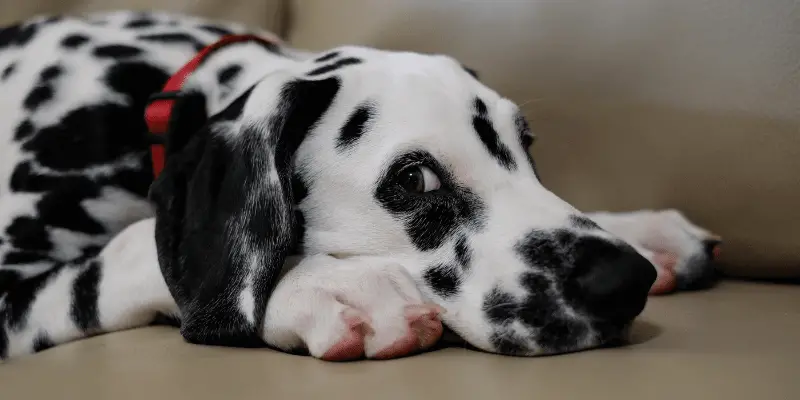
Read our guide on what to do if your 12-week puppy is breathing fast in its sleep – what to look out for.

The Vet's top training tip - 12 week old puppies
"Most pups are doing really well on their toilet training by the time they get to 12 weeks. However, it can still be another few weeks before we can say with certainty a dog is fully house trained. Use the next few weeks to be really consistent with your toilet training, until it has finally ‘clicked’ and accidents are a thing of the past."
- Dr Linda Simon MVB MRCVS
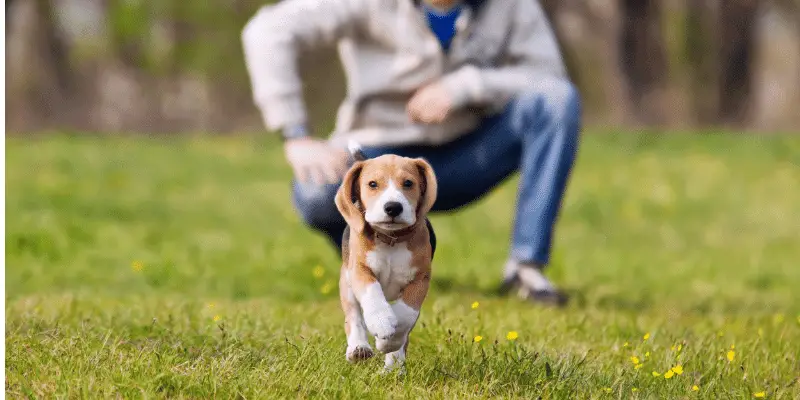
12-Week-Old Puppy Training
At 12 weeks old, your puppy should be making good progress with their potty training. Your pooch should have more control over their bladder at this age, so they will be able to go longer between toilet breaks.
If your puppy is still having accidents, try not to get too frustrated. It can take some dogs a little longer to understand where they need to eliminate. Remember, never punish your puppy for soiling inside the house.
Dogs thrive on positive reinforcement, so rather than punishing them when they get something wrong, reward them when they get something right! Your puppy wants to please you, so when you praise or offer them a treat for a certain action, they’re more likely to repeat it.
Hopefully, your pup has been successfully crate trained at this point, but don’t worry if they’re still getting the hang of it. Again, some dogs take a while to get the gist of things, just be patient and consistent with your training.
Naughty Puppy Behaviour
Your puppy’s behaviour is constantly shifting as they develop and grow, but some of the traits they learn can be problematic in the long run. A bit of mischievousness might not seem like a huge deal while your pooch is young.
However, it can eventually become a concern if allowed to progress. That’s why you should address “naughty” behaviours early on.
Possessiveness
Most puppies go through a “possessive” stage at around 12 weeks old. This usually involves guarding food and toys against other dogs and people.
It’s normal for puppies to do this as in the wild after leaving the den, being protective around food would prevent them from going hungry. But they’re not in the wild, they’re in your home where there’s plenty of food, so there’s no need to be defensive.
You should be actively discouraging this instinct, especially if you have young children.
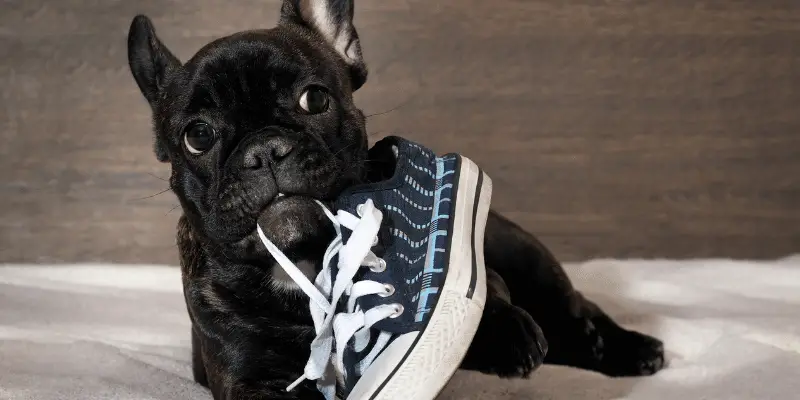
Separation Anxiety
Young dogs often have a tantrum when they’re left alone, but you need to teach them to deal with you not being around 24/7. If your puppy cries or whines when you leave the room or house, don’t be tempted to race back to comfort them.
Instead, wait until your pooch is quiet and relaxed until you return. This will help your pup understand that being calm gets them attention, not being noisy!
12-Week-Old Feeding
Puppies require a high-quality diet targeted specifically for young dogs to ensure they grow up big and strong. Adult dog food is still unsuitable for your 12-week-old puppy as it doesn’t contain the nutrients they need for development.
Your puppy still needs frequent feedings, 3 to 4 split up over the day. Make sure you feed them appropriate portion sizes for their age too. Most commercial puppy foods will have feeding guidelines on the packaging so you can check that you’re feeding your pooch enough.
Keep an eye on your puppy’s weight to make sure they’re not losing or gaining too much body mass. If your companion is regularly leaving a meal, it might mean you’re feeding too much.
Additionally, if you feed your puppy treats in training sessions, make sure you adjust the quantity you feed at mealtimes
12-Week-Old Puppy Socialisation
While your puppy is likely to be on a rampage around the house with all their newfound energy, that energy pairs well for building up their social skills. Your puppy should have had their second vaccination at this age, so you’re free to take them to public places to meet people and other dogs.
Socialising your pooch is critical as it teaches them how to behave around humans and canines. This step is important as it has a huge impact on the type of dog your pup will eventually grow into.
Introduce your companion to as many people, dogs, and places as you can to increase their confidence (puppy classes are a great idea!). If you live in a city or busy area, get your pup accustomed to cars, bicycles, buses, and other normal sights and sounds of everyday life.
They may be excited or frightened the first few times they see or hear something new, and this is completely normal. Don’t make a big fuss out of it and simply keep walking.
Additionally, if your puppy is excited whenever they walk past a stranger, don’t be afraid to politely tell the person not to interact with your dog. It’s important not to reward or unintentionally reinforce undesirable behaviour such as jumping and mouthing. It might be cute while your puppy is small, but it certainly won’t be when they’re a fully grown adult!
With time, your puppy will lose interest on account of being subjected to the object or situation over and over again.
For more information, read our article how to walk a puppy for the first time.
12-Week-Old Puppy Appearance
Your puppy will be a little bigger than they were at 8 weeks old, both in weight and height. However, they still have a lot of growing to do before they reach adulthood size.
Puppies at this age have very soft fur that doesn’t shed very much. When bathing your puppy, opt for a dog shampoo that is hypoallergenic with a low pH so you don’t irritate their sensitive skin.
In addition, your pup’s adult colours and markings won’t be apparent just yet. For example, a Yorkshire terrier puppy is black and tan while young, but turns a golden and bluey-grey colour once mature.
12-Week-Old Puppy Health and Care
By 12 weeks old, your puppy should have had their first course of vaccinations, ideally their second dose too. Once they’ve completed both, there are a lot more adventures you can go on with your pooch.
As your puppy grows, so will their exercise requirements. Daily walks are a vital component of dog ownership as they provide mental and physical enrichment. This is important for your pup’s health and wellbeing, helping prevent many issues such as obesity.
Although your puppy won’t be able to go on long walks just yet, you should still let them burn off some steam at your local park. Around 15 to 20 minutes of exercise is adequate for most puppies.
Be careful not to overexercise your puppy as this can cause strain on their joints and legs, which could result in stunted development or even injury.
Alongside vaccinations and walks, you should be keeping on top of your puppy’s grooming needs. This includes brushing their coat, clipping their nails, and cleaning their teeth and ears.
Depending on your puppy’s breed and the length of their coat, they may need daily or weekly brushing. Either way, it’s important to get your puppy used to grooming equipment as soon as possible to avoid any problems in the future.
Most puppies need their nails clipped every 3 to 4 weeks, but daily walks will help with wearing them down. Only use dog clippers when trimming your pooch’s nails and make sure you avoid the quick (it will look like a dark pink or red root in dogs with clear nails).
Ears should be cleaned once a week with pet ear cleaner and some cotton wool pads. Never insert cotton wool buds or objects directly into your puppy’s ears as this can cause damage to the eardrum or ear canal.
Lastly, aim to brush your companion’s teeth a few times a week with a soft toothbrush and toothpaste tailored for dogs. Bear in mind that most dogs dislike having their teeth cleaned, but the task needs to be done to prevent dental issues like gum disease.

Ask the Vet - When should my puppy get its 2nd vaccination?
"When the second vaccine can be given is dictated by when the first puppy shots occurred. The specific time between vaccines is dictated by the vaccine manufacturer but is usually about 2 to 4 weeks. If too long lapses between vaccines, you would need to ‘re-start’ the vaccine course, to ensure the vaccines work as they should."
- Dr Linda Simon MVB MRCVS

